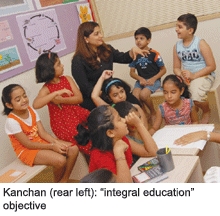An educator who believes that primary education should be life and skills-oriented rather than purely content driven, Mumbai-based Nupoor Kanchan recently (January 2009) registered ILEAP (Integrated Learning Enrichment Achievement Programme), a first-of-its-kind learning centre for children in the age group four-12.
 The mission of the ILEAP is to create an engaging, stimulating education environment in which children can become aware of the world around them. The centre’s curriculum promises “integral education” — “spiritual, emotional, mental and physical development to transform children into explorers, achievers and thinkers”.
The mission of the ILEAP is to create an engaging, stimulating education environment in which children can become aware of the world around them. The centre’s curriculum promises “integral education” — “spiritual, emotional, mental and physical development to transform children into explorers, achievers and thinkers”.
An education graduate of Mumbai’s SNDT Women’s University with over a decade’s teaching experience in highly-reputed institutions, including Sol’s ARC, an educational and therapy centre catering to special needs children in Mumbai, and SNDT, Kanchan also has a diploma in early childhood education from Bombay University, and has been organising special workshops for cognitive development of children for the past ten years. As such, she is equipped with the knowledge and experience to manage an alternative education primary school, which claims to unite the ancient tradition of self-knowledge with the modern goal of acquiring world-knowledge.
“ILEAP offers a holistic education pedagogy to create lifelong learners, who use their mind, body and soul in the pursuit of knowledge. Our children’s curriculum is a unique blend of holistic learning, knowledge acquisition and mind enrichment. It brings joy into education by stimulating learning through discovery and enquiry,” says Kanchan.
Evidently Kanchan’s reputation as a thinking, outcomes-driven educationist precedes her, since 65-70 children are already attending classes I-VI in ILEAP’s 1,200 sq.ft. school in Juhu, Mumbai. This number is slated to rise to 150 by year end. “After class VI, children are encouraged to seek admission in a regular mainstream school. Thus far, the response has been fantastic and we are hopeful our alternative model of primary education will become more popular,” she concludes.
Neha Ghosh (Mumbai)